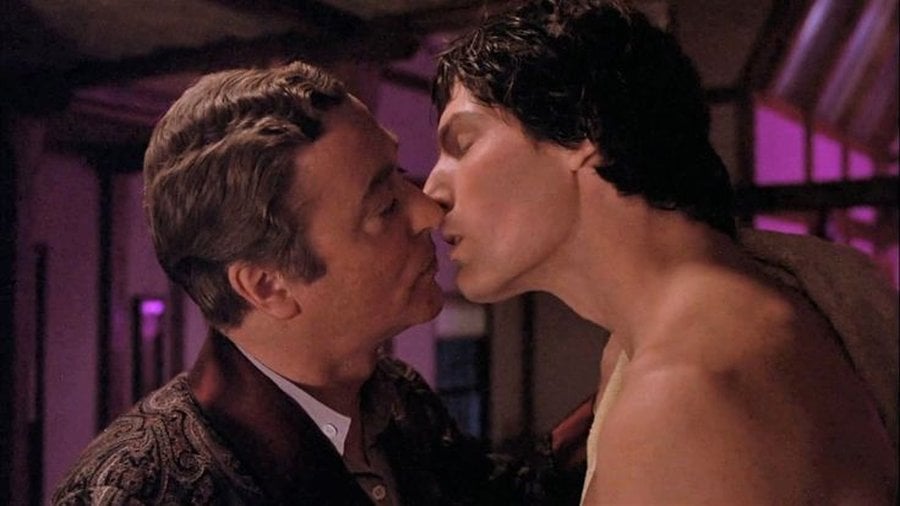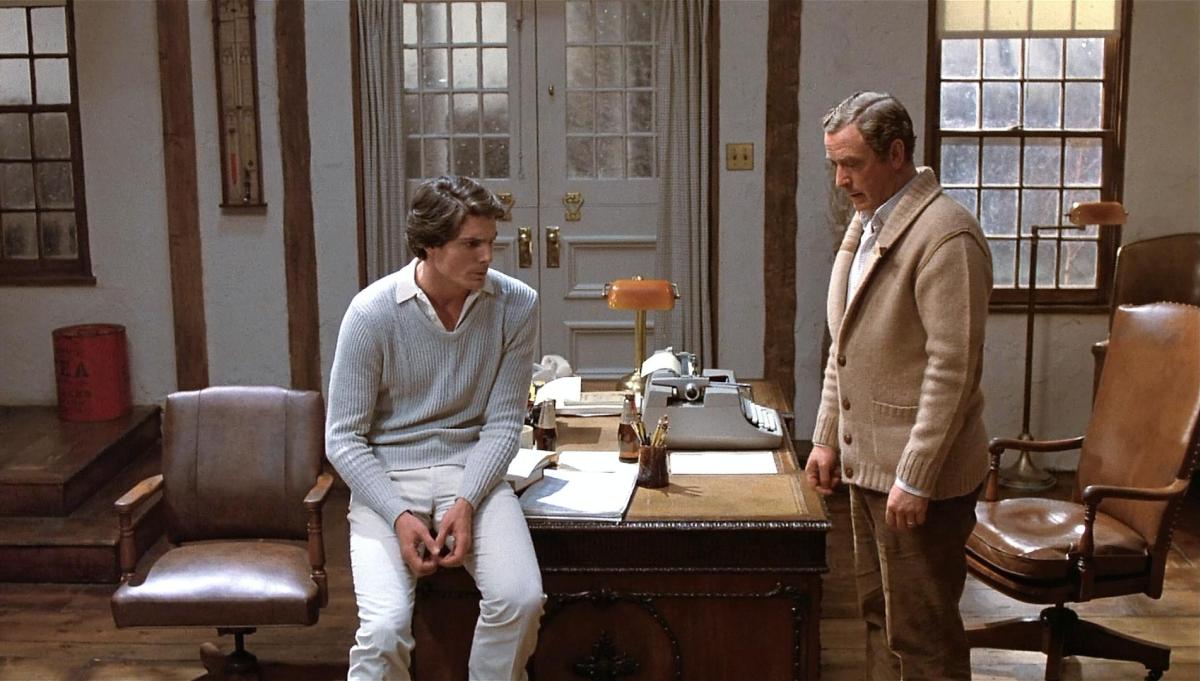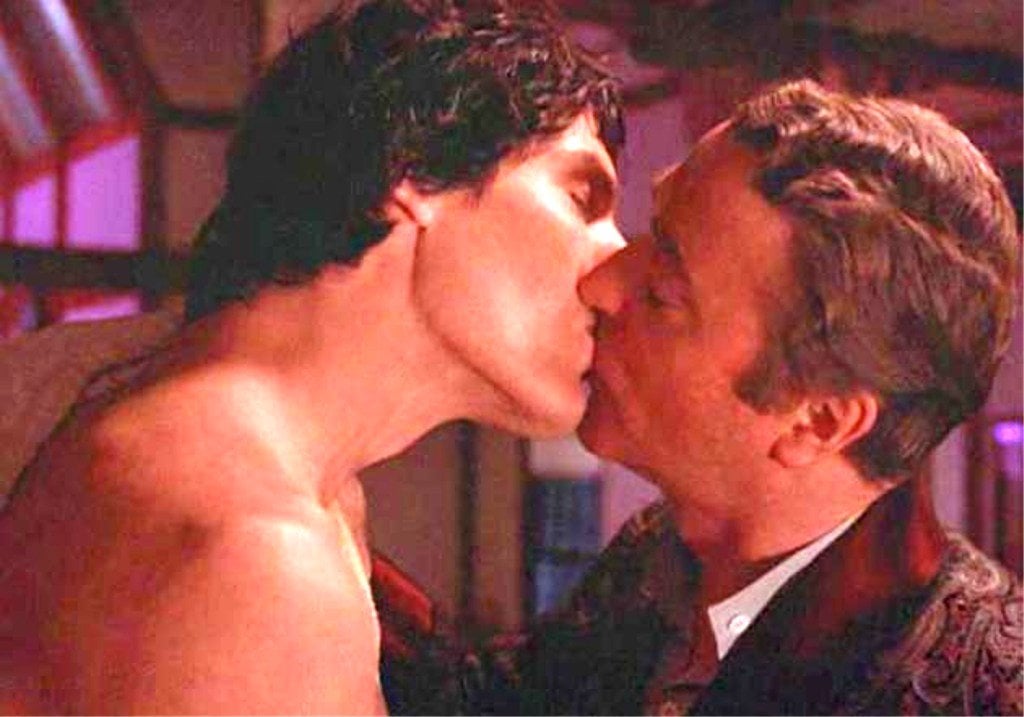Christopher Reeve was at the absolute peak of his Superman fame in 1982. Superman II had dominated box offices the year before, cementing him as America’s ultimate hero – clean-cut, wholesome, and undeniably masculine.
So what did he do next? He decided to kiss Michael Caine on the lips in a major Hollywood thriller.
And let me tell you, all hell broke loose.
The Movie That Changed Everything
Deathtrap, directed by the famed Sidney Lumet, seemed like a safe choice on paper.

Based on Broadway’s longest-running comedy-thriller, it was a clever plot-twisting movie about a desperate playwright named Sidney (Michael Caine) who wants to steal a brilliant script from an aspiring writer named Clifford (Christopher Reeve).
The plan? Kill the young playwright and claim the masterpiece as his own.
Standard thriller stuff, right? Wrong.
About halfway through the movie (Spoiler warning!) Reeve and Caine share a passionate kiss that completely flips everything audiences thought they knew about the story.
Suddenly, it’s revealed that these two men are lovers who are actually plotting together to murder Sidney’s wife.

It was a brilliant twist that wasn’t even in the original Broadway play – and it was absolutely revolutionary for 1982.
The Media Meltdown
Instead of letting audiences discover this plot twist naturally, the media decided to spoil the entire thing.
Time magazine literally published the spoiler, writing that “Michael Caine and Christopher Reeve kiss.” Not content with just ruining the surprise, they made sure to mention that an audience member at the LA screening yelled out, “Say it ain’t so, Superman!”
But Time wasn’t even the worst offender. UPI Hollywood reporter Vernon Scott wrote this professional gem:
“Christopher Reeve, who plays the miracle man from planet Krypton, portrays a homosexual in his new movie Deathtrap. In one love scene he kisses Michael Caine smack on the mouth. Yech!“
Yes, he actually wrote “Yech!” A professional entertainment reporter literally expressed disgust about two actors doing their jobs. In 1982, this somehow passed for legitimate journalism.
The $10 Million Price Tag
Film historian and LGBTQ+ activist Vito Russo estimated that all these spoiler-heavy, homophobic reviews cost the movie around $10 million at the box office. Christopher Reeve and Russo would later call it “the $10 million kiss.”
Think about that number for a second. Ten million dollars. That’s what it cost to show two men kissing on screen in 1982.

Early preview audiences were brutal. People booed during the kiss scene in theaters like Denver. Headlines across the country screamed “Gay Superman” and questioned whether Reeve was still “macho enough” to play the Man of Steel.
Some fans genuinely believed that playing a gay character somehow tainted his ability to portray their beloved superhero.
The whole situation was absurd. Here was a man who had convinced the world that a person could fly, and suddenly he wasn’t hero material because he kissed another man in a movie?
Superman Fights Back
But Christopher Reeve didn’t take this treatment lying down. In a 1983 interview with the Detroit Free Press, he was absolutely scathing about how the media handled the film:
“The press didn’t play fair. They told the major surprise.“
He called the spoilers “an insult to Michael Caine and me“ and didn’t mince words about the financial damage: “You don’t have the right to spill the plot. It cost us $10 million at the box office.“
When people questioned his career choices, Reeve was equally defiant: “I’ve had a lot of training as an actor, and I want to use it.“
Translation: He wasn’t going to spend his entire career trapped in a cape just because it made audiences comfortable.
The Professionals vs. The Sensationalists
What makes the media’s behavior even more inexcusable is how the industry’s most respected critics handled the same film.
Gene Siskel and Roger Ebert reviewed Deathtrap extensively on their TV show, praising its cleverness and performances without spoiling a single plot point.
They understood that their job was to critique the film, not sensationalize its content or ruin the experience for audiences.
Meanwhile, other outlets were treating Reeve’s performance like a freak show, focusing more on shock value than actual artistry. The contrast couldn’t be clearer – true professionals respected the work, while sensationalists exploited it for controversy.
Why This Still Matters
This wasn’t just any actor taking a risk. This was 1982 – the height of the Reagan era, when being associated with anything gay could absolutely destroy a career overnight. Positive gay representation in mainstream Hollywood films was virtually non-existent.
Now, yes – the gay heroes of the film were also villains of sorts, which was another trope of the times – but they were still the two main characters, portrayed by two leading actors.
Christopher Reeve was arguably the most famous actor in America, playing one of the most beloved characters in pop culture. He could have easily stayed in his superhero lane and made millions playing it safe for the rest of his career.

Instead, he chose to challenge his audience. He chose art over easy money. He chose to be part of groundbreaking representation at a time when it was genuinely dangerous to do so.
The Real Superpower
Critics worried that playing a gay man would make Christopher Reeve less heroic, less “Superman.” But standing by your artistic choices when the whole world is telling you you’re wrong?
Defending your co-star when people are writing “yech” about your work together? Refusing to apologize for taking risks as an actor?
That’s what real heroism looks like.
Christopher Reeve didn’t just teach audiences that a man could fly. With Deathtrap, he showed what genuine courage looks like – the kind that doesn’t require a cape or special effects.

The irony is perfect: people worried that playing a gay character would somehow make Reeve less of a Superman. Instead, his principled defense of the role proved he was the real deal all along.
And don’t even get me started on how Superman was (and still is) a symbol for so many queer kids.
Fun fact: Michael Caine later revealed in his memoirs that both he and Reeve were so nervous about filming the kiss scene that they had a few drinks beforehand to get through it. Even Superman needed liquid courage sometimes.
